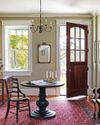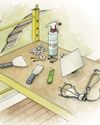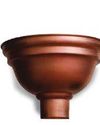
A.J. Johari has an extraordinary eye. His vivid collections fill rooms that are unstudied yet artful, stimulating but friendly. "I started by collecting vintage lamps, scouring flea markets and antiques. Now they're in every room of the house, casting a warm glow on a very eclectic mix of furniture and objects."
The striking Modelice floor lamp resembles a saguaro cactus. A large Cassina Soriana Lounge chair is “perfect for man or dog”.
Anthropomorphism abounds at this colorful third-storey playground, where furniture, art, and accessories seem to come alive. Johari points to a part of his office he calls "the gallery," which is a wall displaying diverse pieces. An antique concave mirror hangs below a Welby starburst clock; an age-stained French wood printing block contrasts with a copper sculpture by Vancouver artist Michael Hewitt: the curated hodgepodge of curiosities is watched over by a taxidermied deer ca. 1979. Johari describes that gallery wall as "an organism" that constantly evolves.
Graham´s small office has a striking wallpaper found on Etsy. Like the floor lamp in the dinning room, this table lamp is part of the California Cactus line designed by Charles Gigliterra in the 1970s for the Modeline Lamp Co.
Spotlight on Modeline Lamps
A.J. Johari is a collector of specialty lamps. He points to his favorite, a striking floor lamp that sits between the living room and dining room; it resembles a saguaro cactus. "It's what I would look like if I were a lamp-kitschy and weird," he divulges. The lamp came from one of the most influential lamp studios in the world, the Modeline Lamp Company. Started in 1946 by Bernie Roberts, it was a revolutionary enterprise both in the forms created and the artists who eagerly submitted designs.
Diese Geschichte stammt aus der July - August 2024-Ausgabe von Old House Journal.
Starten Sie Ihre 7-tägige kostenlose Testversion von Magzter GOLD, um auf Tausende kuratierte Premium-Storys sowie über 8.000 Zeitschriften und Zeitungen zuzugreifen.
Bereits Abonnent ? Anmelden
Diese Geschichte stammt aus der July - August 2024-Ausgabe von Old House Journal.
Starten Sie Ihre 7-tägige kostenlose Testversion von Magzter GOLD, um auf Tausende kuratierte Premium-Storys sowie über 8.000 Zeitschriften und Zeitungen zuzugreifen.
Bereits Abonnent? Anmelden

Navigating the Lumberyard - Here's some lumber lingo you should know before you venture into a lumberyard.
Here's some lumber lingo you should know before you venture into a lumberyard. Almost everyone fixing an old house will end up at a lumberyard-whether it's a local supplier or the organized aisles of a big-box home-improvement store.

a farmhouse renewed
Sensitive renovations and restoration work preserved a house that dates to 1799.

AN OVERVIEW OF METAL ROOFING
METAL ROOFS ARE RESURGENT, FOR GOOD REASONS.

ENDURING BEAUTY IN WALLS of STONE
Now back in the family who had been here since 1830, the old farmhouse is again ready for generations to come. Additions dating to 1840 and the 1950s were preserved.

ARCHITECTURAL DETAILS COME TO LIFE
Owners and their designer celebrate the unique features of a 1912 Arts & Crafts Tudor.

For a Wet Basement Wall
If there's problem common to old houses, it's a wet basement. I'm not talking about occasional flooding, but rather a basement that apparently seeps or leaks after even a rain shower or during snowmelt. Several approaches are available; sustainable solutions will get to the root of the problem.

Patching a Plaster Wall
Fix a hole in the wall with a few common tools and some drywall supplies. Practice your technique!

Roofing & Siding
Make note of these historical and unusual materials for the building envelope.

The Riddle of the water
When water incursion happens, the roof isn't necessarily the culprit. Maybe snaking a drain line, or clearing debris from a clogged gutter, temporarily will stem a leak. But a recurring problem usually means other forces are at work. It takes persistence-and a team with the right skills and patience—to identify the source and apply a solution.

Light-filled Craftsman Redo
For a dark kitchen in a 1914 Illinois house, the trick was anchoring white expanses with woodsy warmth.